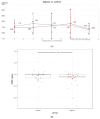Cardiac Glycosides Lower C-Reactive Protein Plasma Levels in Patients with Decompensated Heart Failure: Results from the Single-Center C-Reactive Protein-Digoxin Observational Study (C-DOS)
- PMID: 35407370
- PMCID: PMC8999566
- DOI: 10.3390/jcm11071762
Cardiac Glycosides Lower C-Reactive Protein Plasma Levels in Patients with Decompensated Heart Failure: Results from the Single-Center C-Reactive Protein-Digoxin Observational Study (C-DOS)
Abstract
Recent randomized controlled multi-center trials JUPITER, CANTOS and COLCOT impressively demonstrated the effect of anti-inflammatory therapy on secondary prevention of cardiovascular events. These studies also rapidly re-vitalized the question of whether the C-reactive protein (CRP), the prototype human acute phase protein, is actively involved in atherosclerosis and its sequelae. Direct CRP inhibition may indeed improve the specificity and effectiveness of anti-inflammatory intervention. In the present paper, we report on the final results of our single-center C-reactive protein-Digoxin Observational Study (C-DOS). Methods and Results: Based on the experimental finding that cardiac glycosides potently inhibit hepatic CRP synthesis on the transcriptional level in vitro, 60 patients with decompensated heart failure, NYHA III−IV, severely reduced Left Ventricular Ejection Fraction (LVEF < 40%), and elevated CRP plasma levels were treated by either digoxin + conventional heart failure therapy (30 patients) or by conventional heart failure therapy alone (30 patients). Plasma CRP levels in both groups were assessed for 21 d. Plasma CRP levels on d1, d3 and d21 were compared by regression analysis. CRP levels d21−d1 significantly declined in both groups. Notably, comparative CRP reduction d21−d3 in digoxin versus the control group also revealed borderline significance (p = 0.051). Conclusions: This small observational trial provides the first piece of evidence that cardiac glycosides may inhibit CRP synthesis in humans. In case of further pharmacological developments, cardiac glycosides may emerge as lead compounds for chemical modification in order to improve the potency, selectivity and pharmacokinetics of CRP synthesis inhibition in cardiovascular disease.
Keywords: CRP; CRP synthesis inhibition; cardiovascular disease.
Conflict of interest statement
The authors declare no conflict of interest.
Figures

References
-
- Pearson T.A., Mensah G.A., Alexander R.W., Anderson J.L., Cannon R.O., Criqui M., Fadl Y.Y., Fortmann S.P., Hong Y., Myers G.L., et al. Markers of inflammation and cardiovascular disease: Application to clinical and public health practice: A statement for healthcare professionals from the Centers for Disease Control and Prevention and the American Heart Association. Circulation. 2003;107:499–511. doi: 10.1161/01.CIR.0000052939.59093.45. - DOI - PubMed
-
- Reynolds G.D., Vance R.P. C-reactive protein immunohistochemical localization in normal and atherosclerotic human aortas. Arch. Pathol. Lab. Med. 1987;111:265–269. - PubMed
-
- Torzewski J., Torzewski M., Bowyer D.E., Fröhlich M., Koenig W., Waltenberger J., Fitzsimmons C., Hombach V. C-reactive protein frequently colocalizes with the terminal complement complex in the intima of early atherosclerotic lesions of human coronary arteries. Arterioscler. Thromb. Vasc. Biol. 1998;18:1386–1392. doi: 10.1161/01.ATV.18.9.1386. - DOI - PubMed
LinkOut - more resources
Full Text Sources
Research Materials
Miscellaneous

